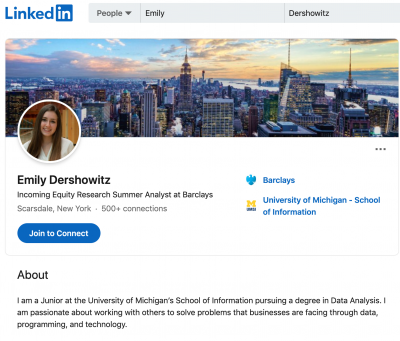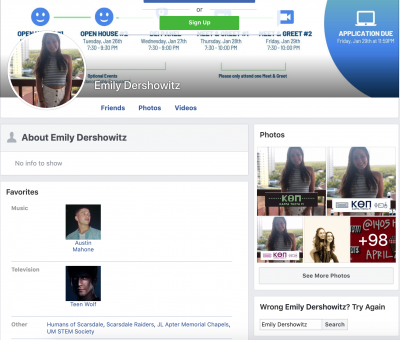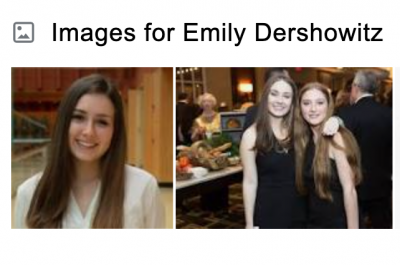Emily Dershowitz
The unfortunate reality of today is that everyone Googles everyone before a scheduled meeting takes place. Sure, you can argue that you might do this for safety reasons (who would want to get coffee with a serial killer when it could be avoided?), but I’m willing to bet, once again, that you don’t stop digging once you realize that person hasn’t committed any crimes. You most likely click on at least the top 3 or 4 search results and dig through to find any sort of information that you deem interesting or helpful. And, whether it’s a job interview or a blind date, I’m sure you find a way to “slyly” guide the conversation towards that piece of information if the conversation is headed towards a lull.
But, what perplexes me the most about this “Google everyone you meet phenomenon,” is that, the version of me that is represented online is only a fraction of the person I am in real life. People should not Google others before meeting because the online version of that person is often out of date and missing important aspects and personality traits that can’t be translated online.
Google Search
When I inputted “Emily Dershowitz” into Google, I wasn’t all that surprised at what came up. From a very young age (probably around the time I made my Instagram account in middle school), my mother warned me to be careful about what I shared online because “you never know who is going to see it.” So, I was always cautious about what I shared with the online world. And, over time, that caution turned into indifference and the “better safe than sorry” method took over. I haven’t posted on Instagram in over a year (I actually deleted the app about a month ago), I never post anything on Facebook (other people will post images of me and tag me, but that’s about it) and I only really Snapchat my close friends.
So, I wasn’t too surprised to see the first result that comes up when I Google myself is my LinkedIn profile. This is the professional version of myself that I spent hours editing and curating. Setting up a professional headshot, asking friends and mentors to read and edit my bio, and carefully wording the descriptions for the work that I’ve done all in the hopes of catching a recruiter’s eye. This is a version of myself that I created specifically to be shared online with others. In other words, this profile exists for strangers to Google me and get a premature idea of who I am professionally as that is the purpose of LinkedIn (people create LinkedIn accounts to share information about themselves with others, often strangers).
But, who I am professionally is not a complete picture of who I am. Sure, they might get an idea about some of the things I’m interested in based on what I’m involved with. For example, viewers of my LinkedIn profile can probably safely infer that I’m passionate about technology based on my involvement in the professional technology fraternity, Kappa Theta Pi as well as STEM Society, but I still think there is more to me than just my passion for technology. If a potential employer or recruiter were to view this profile to decide if they wanted to interview or even hire me based on it, they wouldn't be making the decision based on me as a complete person. They would miss out on my taste in music (pop or songs from old Disney channel movies), my sense of humor (even though my brother says I'm not funny) and how I love to travel (going to Australia is number one on my travel bucket list right now). There are many aspects of my day-to-day life that make me who I am that can't be found within this profile, and technology, just like my professional version of myself, is not the only piece of the puzzle.
The next result that came up when I Googled myself was my Facebook account. After reading through my profile in an Incognito browser, I felt like I travelled back in time to 2015. I was presented with obsessions that my 15 year-old self had and my 21 year-old self has completely forgotten about (probably for the better). With Facebook, when you’re not friends with someone you can’t see any of their images, all you can see is what they choose to make available to you, in this case it was my “likes.” So, I was taken aback when I was presented with my “Music Favorite” of Austin Mahone and my “Television Favorite” of Teen Wolf, both of which I haven’t listened to/watched in years. So, while this online version of myself may have had some merit in 2015, it is in no way a reflection of who I am today (other than the fact that I’ve seen every episode of Teen Wolf and sat second row at an Austin Mahone concert years ago), as I’m not interested in those things anymore. If someone were to Google me in an attempt to find a topic of conversation to bring up in case there's a lull in our meeting and they brought up Austin Mahone, I wouldn't really have anything to talk about. I might mention that I used to be a fan of his, but that's about it. When people are viewing this out of date information, Google is essentially helping them formulate an incorrect assumption about who I am as a person.
Furthermore, if someone were to be friends with me on Facebook, they would be able to see images that my friends have posted of me (as I don’t post images myself). And, I would argue that this isn’t a proper representation of my offline self either. Many of my close friends either don’t have a Facebook account or choose not to post on theirs. So, the images that I'm tagged in are only representative of how my friends who post on Facebook see me. For example, my family used to go white water rafting with my family friends every year. And every year, someone would tag me in an image of all of us together smiling and standing next to the water. If someone viewed my Facebook profile and didn't know any better, they would assume that I loved white water rafting. However, that's not the case. I actually hate white water rafting and I only went on the trips because my family friends don't know that I don't like white water rafting and I didn't want to make them feel bad. But, someone taking a quick glance through my Facebook profile wouldn't be able to see that, they'd just see me smiling in a lifejacket by the water. So, if someone is trying to figure out who I am based on just the images that my friends who choose to post on Facebook post, all they would be getting is the version of myself that my friend sees. And, that’s not representative of who I am.
Global Lyme Alliance
And finally, when I Googled myself, I found images and a video of work that I’ve done with the Global Lyme Alliance. First, was an image of me and my friend attending a GLA Gala that I was honored at (seen on the right). The photo is posted on the event photographer’s website with both my and my friends first and last names in the comment under the photo (I’m still unsure of how she matched our names to our photo as I’ve never met the photographer before and had no contact with her before/after the event. I do though remember signing a photo release at the event, giving her permission to use any photos taken of me). There is also a video that I participated in called “Living the Lyme Life.” However, I participated in these endeavors in high school. And, while they were a big part of my life back then, and are of course important to me, I wouldn’t say that video and honor I received in high school play a big part of my life now. So, once again, if someone were to create an idea as to who I am based off of these GLA results, that version of myself is more representative of who I was five years ago than who I am today.
Conclusion
So, I still don’t understand why people continue to Google others before meeting. There is so much about a person that can’t be translated online. Yes, you might get bits and pieces about a person, like someone knowing about how I’m passionate about technology, or shows and music that I listened to in middle school, but that's not representative of who I am today. The “Google everyone you meet phenomenon” strips away the excitement that comes from getting to know someone new. Having already done research, people have a preconceived idea about the person they are talking to based solely on random bits and pieces of information that might not even be accurate or up to date.
Most of the fun in meeting new people is just that. Meeting new people. And, until we stop Googling everyone before we meet, that fun and excitement will be gone.



